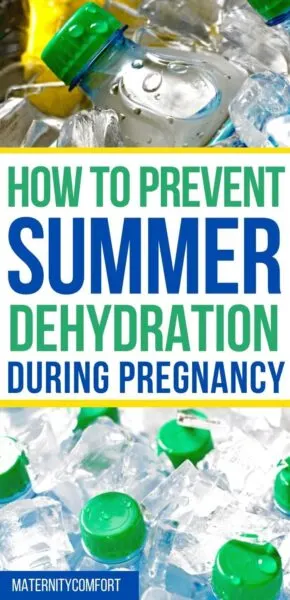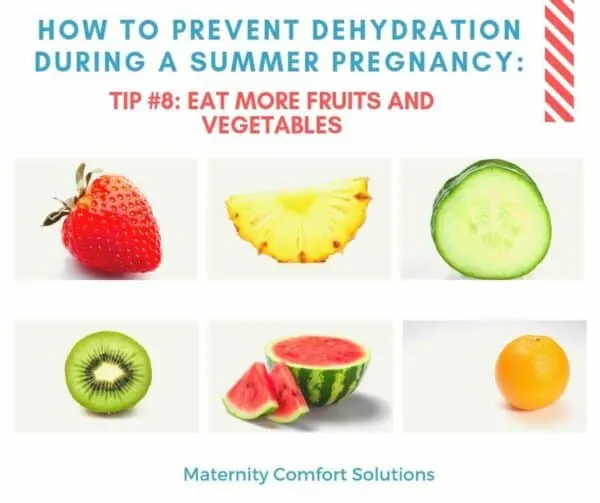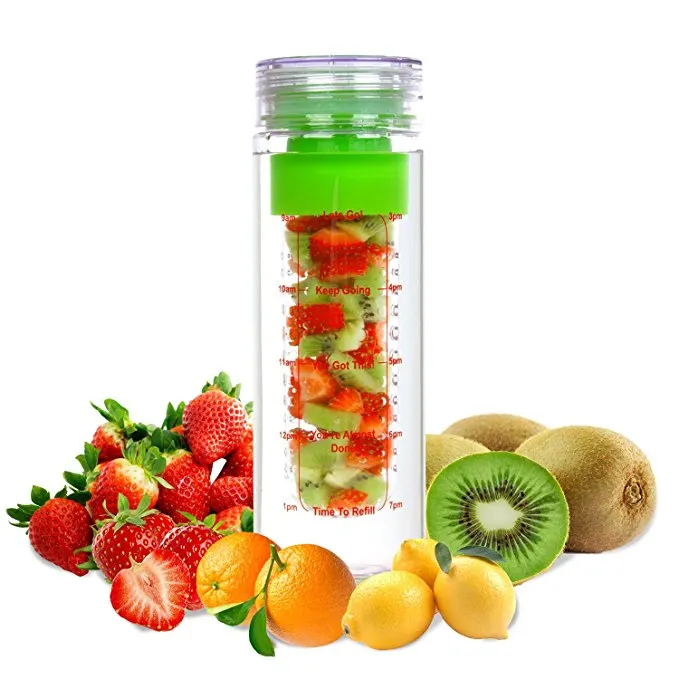Updated August 5, 2022
Are you wondering how to prevent dehydration during pregnancy, especially during the summer heat?
We are sharing our very best proven way to keep you well-hydrated during a summer pregnancy.

Our bodies depend on water for survival.
During pregnancy, water is in high demand to produce amniotic fluid, power your higher metabolic needs and increase your blood volume to carry the essential nutrients and oxygen to your growing baby.
If you live in a warm climate, learning how to prevent dehydration during pregnancy is crucial to avoid pregnancy complications during the hot summer months.
(Written by Doug Penta, MD, Ob/Gyn, and Sue Winters, RN)

Dehydration occurs when you lose more water than you take in.
This is also referred to as having a fluid deficit.
During pregnancy, maintaining fluid balance is important.
Preventing dehydration, especially during the hot summer months can be difficult.
The number one thing you can do during a summer pregnancy to prevent dehydration is to drink more fluids!

10 Tips To Prevent Dehydration in Pregnancy:
1. Drink more water even if you are not thirsty.
Pregnant women need to drink 8-12 cups of water a day and maybe more in the summer.
The good news is even if you can’t stand plain water, you still have TONS of options to be sure you are getting enough fluids.
The only way I can drink plain water is if it is really cold. That’s one suggestion. But our second tip below might work even better if you don’t like plain water, cold or not.
2. If you can’t stand plain water, try a water infuser.
You can infuse your water with fresh fruits, vegetables, or pregnancy-safe herbs.
Some fruits and vegetables that make good choices for infused water are:
- Raspberry
- Strawberry
- Orange
- Lemon
- Lime
- Cucumber
- Blueberry
You want to make sure the fruit is fresh, washed, and not too soft or mushy.
It takes about 4-6 hours for the flavors to infuse through the water.
The safest way to do this is to let the water and your choice of added ingredients infuse in the refrigerator.
You should plan to drink your infused water within 24 hours. The same day is probably best during pregnancy.

Infused water is delicious and a healthy way to prevent dehydration during pregnancy. I love this water infuser bottle: LA Organics Fruit Infuser Water bottle (BPA Free)
3. Drink juice, milk, or sparkling water and broth
If you can’t stand the thought of drinking any more plain water, there are lots of other options!
When it comes to juice you’ll want to exercise some restraint and caution.
Many juices contain added sugar which could contribute to you gaining too much weight and increasing your risk of gestational diabetes.
You want to be sure your juice is pasteurized to avoid any type of bacteria that could harm you or your growing baby.
If you drink milk stick with low-fat or non-fat varieties.
Drinking broth is a great option!
Broth and soups can also lessen nausea if you are in the “morning sickness” phase of pregnancy.
Nausea and vomiting can cause you to become dehydrated so if you are feeling queasy sipping on broth can help.
4. Limit your caffeine intake
Concerns about caffeine intake during pregnancy have been discussed for many years.
The current recommendation is to limit caffeine to no more than 200mg a day. (Source)
Since caffeine is present in many dietary sources (coffee, tea, chocolate, and soda) it is very easy to exceed this amount of caffeine on a daily basis.
Caffeine increases urination by interfering with the hormonal regulation of kidney function.
This increase in fluid loss can lead to dehydration.
5. Keep a filled, insulated water bottle with you at all times.
Keeping a full water bottle with you is definitely the best way to prevent dehydration. As is often said, “Out of sight is out of mind”!
It is much easier to stay hydrated when the water is right next to you.
Fill your water bottle in the morning and at lunch and you should be good to go. The insulated water bottle we use and love most is the Hydro Flask.
It is on the pricey side though.
If you are looking for a less expensive option these insulated water bottles make a great choice too!
 6. Make sure your urine is clear to light yellow and negative for ketones
6. Make sure your urine is clear to light yellow and negative for ketones
This may seem a little gross, but one way to determine if you are getting dehydrated is to check if your urine is darker than usual.
If you are dehydrated your urine will get darker because it is more concentrated. If this happens you will want to drink more water.
You should never try to diagnose yourself if you think you are dehydrated or are having contractions.
However, if you want to have a sense of whether you are preventing dehydration, you can get urine ketone test strips. Online or at your local drugstore.
This is the same urine dipstick evaluation done in the office.
If the ketones are positive (purple) it is an indication you will want to drink more water.
This information will be very familiar to those who have been to the office many times for dehydration.
Again, it is important to stress that this information is not to be used to evaluate your medical condition if you have concerns about dehydration or contractions.
The use of ketone test strips can be helpful to check when you have no concerns and want to see if you are drinking enough fluids.
7. Do not over-exert yourself.
It can be easy to overdo it during pregnancy.
Be cautious not to exercise too much, gentle exercise like walking and swimming is generally safe (clear with your provider first).
Exercise causes us to lose fluid through sweat, so be sure to drink while exercising.
Avoid extreme heat. During the summer months try to do your house cleaning and errands earlier in the day to avoid the heat of the day.
Maternal overheating is a common sign of dehydration in pregnancy.
If you are already struggling to drink enough and you are out in the heat, you are more prone to overheating.
8. Eat fruits and vegetables.
Eating fruits and vegetables is another great way to keep yourself well hydrated to avoid dehydration during pregnancy.
Fruits and vegetables can be a great choice!
- Watermelon
- Cantaloupe
- Zucchini
- Cucumber
- Orange
- Apples

9. Ice pops, popsicles and Pedialyte pops can help you increase your fluids.
Ice pops, popsicles, and Pedialyte are ways to ingest fluid in small amounts to prevent dehydration related to morning sickness.
During the first trimester, it can be difficult to drink enough fluids.
Unfortunately, if you have morning sickness, dehydration can be hard to treat because you cannot take in enough fluid.
Making your own popsicles is an excellent way to keep yourself hydrated, and they are effortless to make.
Below are some homemade popsicle recipe books. I like to make my own popsicles, especially when pregnant. I like to know what is in the food or drinks I’m eating.
[content-egg module=Amazon template=grid next=3 hide=price cols=3]
10. Avoid extreme heat and humidity.
Avoiding extreme heat and humidity is crucial and perhaps the most effective way to prevent dehydration during pregnancy.
To stay cool, try to run errands and do any housekeeping chores in the morning.
Spend the hottest time of the day out of the sun whenever possible.
This will help prevent swelling and is the best approach when it comes to how to prevent dehydration during pregnancy.
Getting plenty of rest can also help reduce episodes of nausea and vomiting which will help prevent dehydration during pregnancy.
Why is it so easy to get dehydrated when pregnant?
If you want to have a good understanding of dehydration and how to prevent dehydration during pregnancy, now is a good time to review some details about how your body maintains your fluid balance and how it is measured by your medical providers.
Fluids that are lost need to be replenished. This is especially true with the increased demands of pregnancy. Failure to replace lost fluids causes severe dehydration quickly during pregnancy.
When individuals experiencing dehydration are admitted to the hospital, fluid balance is monitored very closely.
Fluid input versus fluid output (also referred to as I’s and O’s) are carefully recorded.
Fluid intake must equal fluid output at all times.
What can be difficult to measure is the fluid loss we cannot easily measure such as sweating and moisture lost through breathing.
Hopefully, the concept of fluid balance will be easier to understand and manage as we review the various ways we take in and lose fluid every day.
Fluid Input:
- Fluids you drink every day
- Fluids you get through the foods you eat.
- Intravenous fluids are administered if you are in the hospital
- During pregnancy the body’s natural 50% increase in blood volume.
Fluid Output:
- Fluid loss through voiding (urinating).
- If a patient is vomiting during their hospital stay, this fluid loss is measured.
- Diarrhea is another source of fluid loss that is measured.
- Insensible losses (sweating, moisture lost through breathing) are recorded daily. Since this cannot be measured it is based on a patient’s size. For the average individual, it is estimated to be about 500cc’s/day of fluid is lost each day.
- Any bleeding would be considered measured as a loss of bodily fluid.
Understanding how to prevent dehydration during pregnancy is not always easy because of the fluid losses due to vomiting and swelling.
Swelling can actually account for liters of fluid retained in the tissues.
NOTE: If you have swollen ankles, you will notice that pressing on the area will leave a temporary mark.
This is a result of fluid (edema) that has leaked out of the blood vessels and into the surrounding tissues.
Preventing dehydration during pregnancy is very important to avoid serious complications for you and your growing baby.
Complications From Dehydration During Pregnancy:
- Low amniotic fluid
- Birth defects
- Neural tube defects (Early in pregnancy)
- May impact your milk production
- Premature labor
What are the Signs and Symptoms of Dehydration During Pregnancy
Aside from uterine contractions, the following are some other clinical signs and symptoms of dehydration during pregnancy:
- Feeling thirsty (though dehydration can occur during pregnancy without feeling thirsty.
- Headaches especially when standing.
- Constipation
- Sleepiness
- Dry mouth with chapped lips
- Poor skin elasticity. When you pinch your skin it is slow to return to normal.
- A decrease in visits to the bathroom
- Dark-colored urine (concentrated urine)
- Feeling dizzy or light-headed when quickly getting out of bed or standing up.
Drinking Enough Water Helps Prevent Contractions During Pregnancy
Dehydration is a common cause of contractions during pregnancy.
For this reason, knowing how to prevent dehydration during pregnancy is very important.
During the summer, pregnant women can become dehydrated rapidly, resulting in many same-day office visits to evaluate contractions to be sure they are not an indication of premature labor.
When experiencing contractions only a clinical evaluation (cervical exam) can determine if the contractions are related to premature labor.
This is where it can be said that medicine is not an exact science.
We all know the expression “an ounce of prevention is worth a pound of cure”…. perhaps this situation is more like: “an ounce of detection is worth a pound of cure.”
The following is a common doctor’s office occurrence due to pregnancy dehydration during the hot summer months:
1. An expectant mom in her second or third trimester calls the office to report cramping that is becoming regular and strong. Often the cramping is described as a tightening that radiates around to her back.
The office triage nurse will ask questions about the cramping. Including questions about the patient’s latest physical activity, if the patient has a history of premature labor during a prior pregnancy, etc.
Regardless of the information acquired over the phone, the patient will then be told to come to the office for an evaluation.
2. The examination will include vital signs (blood pressure, pulse) as well the other clinical parameters that are checked at every prenatal visit: fetal heart rate, swelling assessment, weight gain, etc.
If contractions are confirmed with fetal monitoring, the office examination will include a cervical exam.
Cervical dilation or change is the clinical finding necessary to diagnose premature labor.
This is based on the definition of labor: Uterine contractions associated with cervical change.
Two office tests are used to help diagnose pregnancy dehydration:
- Urine Dipstick – A urine dipstick measures ketones in the urine and the urine-specific gravity. These two laboratory measurements help diagnose dehydration. When dehydrated, urine ketones increase and urine concentration (specific gravity) increases.

KETONE SCALE
- Uterine Monitoring – this is the same monitoring that is done in the hospital during labor. If contractions are present, the monitor will show the interval and duration of the contractions. If they are caused by dehydration they often will resolve quickly once intravenous hydration is started. (Hydration will clear the ketones and the urine will become lighter because it is less concentrated.)
Other pregnancy posts you may find helpful:
- 9 Tips On How To Survive A Summer Pregnancy
- 10 Tips On How To Fight Fatigue During Pregnancy
- How To Prevent Swelling During Pregnancy
Though staying well-hydrated during pregnancy can be a challenge.
It is our hope that the information discussed has explained how to prevent dehydration during pregnancy.



